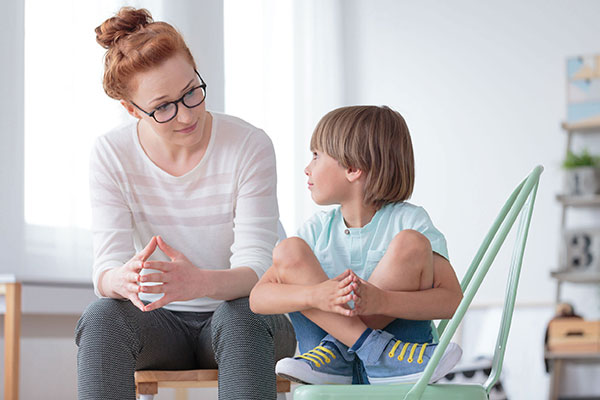When a Parent Has Cancer
Tips You Can Use to Help Your Children Cope with Your Diagnosis
by Katelyn MacDougall, MSW, LICSW, and Kelly Giles, MSW, LICSW
When a parent is diagnosed with cancer, one of the first questions they ask is “What do we tell the kids?” Unfortunately, many things happen in life that we cannot protect our children from. Cancer is one of them.
What you can do, however, is give your children the tools to cope with and adjust to the challenges life may throw at them. Here are some tips you can use when helping children through a parent’s illness.
- Take time to grasp for yourself what is happening. Give yourself time to process this new diagnosis. If you have a spouse or a co-parent, make sure you’re both on the same page. Kids need to understand that you and other family members are in this together.
- Use age-appropriate, concrete language. Children often sense when something has changed within their environment. In fact, their anxiety can increase if there is silence when they notice change. Update them using words they can understand.
- Use the word cancer. Children have wonderful imaginations. This can lead them to a distorted understanding of your diagnosis and what it means, one that may be worse than the reality of your situation. Be sure to tell them that nothing they said or did caused your cancer. Let them know they cannot catch it. Talk with your children and explore what they already know about cancer. They may have picked up some ideas about cancer from another child or from something they’ve seen on TV. It’s important to distinguish your cancer from that of others, as children may generalize the cancer experience and apply other people’s circumstances to yours.
Children are intuitive. If what you are saying is different from what you are showing, your children will notice.
- Tell the truth. It is important to establish a relationship where your children can trust you. They need to feel safe bringing their questions and concerns to you and need to have the reassurance that they are being told the truth.
- Give regular updates. Kids may not ask questions, as they might not know what to ask or may sense that it is better not to. Create space and time to provide them with updates, perhaps through regular family meetings. This is another way to build trust and help them feel like the family is in this together.
- Know that you don’t have to answer everything right away. You can defer any tough questions. It is OK to say, “That’s a good question. I don’t know the answer right now, but I will find one for you.” Parents often worry about their child asking a difficult question like “Are you going to die?” You can let them know some people do die from cancer, but that is not your plan. But be careful to not make any promises. A helpful way to answer that hard question is by saying, “I am working with my doctor, and the goal is to get rid of the cancer and make me feel better.” It can be helpful to reassure them that if anything changes, you will let them know.
- Show your emotion. Children are intuitive. If what you are saying is different from what you are showing (for example, saying you are fine but appearing teary-eyed), your children will notice. It is important to acknowledge that cancer can be tough stuff and it is OK to cry. It is also OK to jump with joy when receiving good scan results. Teach children how to express what they may be feeling inside.
- Keep structure, rules, and routine. Children need structure. They need to know they will be cared for and have some sense of normalcy. Reassure them there will always be someone to love and care for them. Create a plan for who will pick them up from school or cook dinner if an unexpected doctor appointment arises. You may find that your children are testing the household limits. Stick to your pre-cancer rules and discipline so they know this aspect of their lives will remain the same.
Above all, remember that children are resilient. It is not possible to protect them from all difficulty in life, but you can build on their strengths and support them when they are faced with challenges. Seek additional professional support if they (or you) need it. Plenty of social workers, teachers, and guidance counselors have expertise dealing with these types of situations, so know that you don’t have to do it alone.
Be gentle with yourself. Parenting is difficult enough without cancer being thrown into the mix. Have confidence that your children can grow and cope with this new challenge of cancer in the family.
 Katelyn MacDougall (left) and
Katelyn MacDougall (left) and  Kelly Giles (right) are clinical oncology social workers at the Dana-Farber Cancer Center in Boston, MA. In addition to their clinical roles, they have been working together to implement programming and resources to support parents and their children in coping with cancer in the family.
Kelly Giles (right) are clinical oncology social workers at the Dana-Farber Cancer Center in Boston, MA. In addition to their clinical roles, they have been working together to implement programming and resources to support parents and their children in coping with cancer in the family.
This article was published in Coping® with Cancer magazine, May/June 2019.


